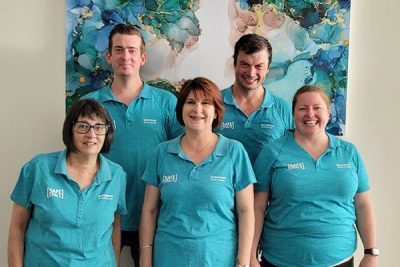Safe Space supporting those in distress
An innovative model of care provided by Metro North Mental Health (MNMH) at The Prince Charles Hospital (TPCH) is providing valuable support for patients presenting to the Emergency Department with mental health distress.
Opened in January 2021, the new Safe Space provides a dedicated, non-clinical, home-like area for people who are currently experiencing or are at risk of developing a mental health crisis, to allow timely intervention and compassionate care.

TPCH Safe Space team
Patients are supported by Peer Workers who have a lived experience of mental illness, as well as a senior mental health clinician who help patients to deescalate without the competing priorities of a busy Emergency Department (ED).
MNMH-TPCH Operations Director Dr Senthil Muthuswamy said it was not uncommon for those experiencing mental health concerns to find the ED environment unsuitable, and the Safe Space is making a huge difference to those seeking help.
“For a long time, it has been recognised that the high stimulus ED environment is not the most ideal place for patients with acute mental health presentations. Staff in the Emergency Department are often having to simultaneously manage multiple other high acuity presentations including trauma, stroke and heart attacks,” Dr Muthuswamy said.
“Therefore, those with mental health issues or distress may have to wait a long time for someone to see them, whilst experiencing feelings of heightened anxiety and hopelessness, when we know they will benefit from talking to someone quickly and avoid the situation becoming critical.
“With the Safe Space, we can quickly provide support to those with mental health concerns and can also look at pathway options available if they are needed – but often these patients can be managed directly by having someone they can talk to.”
A senior mental health clinician, advanced peer worker and four peer workers work in Safe Space, using personal experience as a tool to help others presenting to the ED in distress.
“Peer workers can relate and empathise in a way that is unique to their experience, this can help to reduce the patient’s distress, build rapport, provide reassurance, and offer alternate support pathways if hospital admission is not required,” Dr Muthuswamy said.
“Queensland has one of the highest rates of suicides of any state across Australia, and we are hopeful that this new approach to deescalating mental health presentations will directly save lives.”
QUALITY OF CARE
TABLE OF CONTENTS
